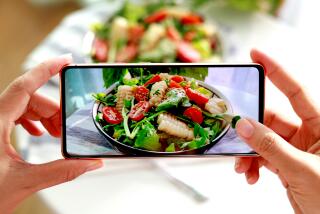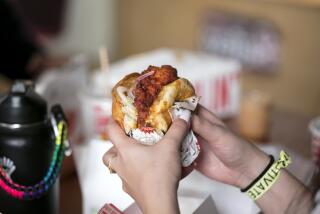In the mood for (over) eating
- Share via
Turkey and dressing. Mashed potatoes and gravy. Corn bread and cranberry sauce.
This Thursday, many of us will scarf down second (even third) helpings of all of the above and more -- then top it off with a slice or two of pie.
It’s as plain as the crumbs on our faces: We don’t always eat because we’re hungry.
We eat because it’s Thanksgiving and by golly, we’re supposed to. We eat because we’re missing Grandma or because we’re irritated with Uncle Fred. “Often, people eat in response to emotional, cognitive or social cues, in response to things that are not hunger,” says Heather Niemeier, professor of psychiatry at Brown University Medical School in Providence, R.I.
Just how many pounds we pack on (or keep off or fail to lose) may depend on what type of cues, other than hunger, get us eating, according to new research.
Overeating for emotional reasons can derail a diet, the research shows -- while overloading at parties (or big turkey meals) may not.
In a study published in the October issue of the journal Obesity, a team of researchers led by Niemeier separated nonhunger eating cues into two categories: eating for “internal” reasons -- for example, how we’re feeling, what we’re thinking -- and eating for “external” reasons -- such as where we are, who we’re with and how good the food tastes.
As they expected, the researchers found that a tendency to eat for internal reasons was associated with dieters not losing weight and with previously successful dieters gaining some weight back. But they were surprised to see that a tendency to eat for external reasons was not linked.
The finding is significant, because it suggests a weakness in many weight-loss programs, Niemeier says -- namely, not focusing enough on ways to avoid emotional eating.
“We need to pay more attention to these internal triggers for unhealthy eating,” Niemeier says.
--
Connecting the dots
Our reasons for eating can be complicated, and we may not even be aware of all of them ourselves. To try to disentangle the reasons a bit, Niemeier’s team at the Weight Control & Diabetes Research Center at the Miriam Hospital in Providence looked at two groups: people who were currently overweight and people who had been overweight at some time in the past.
The first group included 286 male and female participants in a behavioral weight-loss program; the second consisted of 3,345 men and women who were part of the National Weight Control Registry, an ongoing study of adults who have lost at least 30 pounds and kept them off for at least a year.
Everyone in the study completed a questionnaire called the eating inventory, a standard tool used in obesity research. But the researchers focused only on items related to reasons we eat even when we’re not hungry. They divided these items into “internal” and “external” cues.
Internal items included: “When I feel blue, I often overeat”; “when I feel lonely, I console myself by eating”; “while on a diet, if I eat a food that is not allowed, I often then splurge and eat other high-calorie foods.”
External items included: “I usually eat too much at social occasions, like parties and picnics”; “when I am with someone who is overeating, I usually overeat too”; “sometimes things just taste so good that I keep on eating even when I am no longer hungry.”
Internal cues were related to weight change in both groups. The more likely people were to eat for emotional reasons, the less weight they were likely to lose (in the first group) and the more weight they were likely to regain (in the second group).
External cues weren’t related to weight change in either group.
Niemeier, who is now examining eating cues in normal-weight college students, says she wasn’t expecting the second, external cue result and doesn’t have a definite explanation for it. It’s possible, she says, that the finding could be wrong, perhaps because the inventory of external cues is old, and some items might need to be updated to reflect current environmental triggers for eating.
But it’s also possible, she adds, that internal cues are more powerful or more common than external cues, and that’s why they lead to increased calorie intake.
Michael Lowe, a professor of psychology at Drexel University in Philadelphia, speculates that the situation might be just the opposite, that external cues are ubiquitous -- in abundant food, unavoidable ads, super-sized servings in restaurants -- and they have “such a powerful effect on almost everyone that it’s not as easy to pick up differences between people.”
On Thanksgiving Day, for instance, just about everybody feels the pressures of tradition, delicious aromas, pleas from mom to “have some more.” So any differences in how much people eat would almost have to come from differences in internal cues.
Some earlier studies support the notion that internal eating cues are associated with weight gain and the failure to lose weight.
For example, in a 2004 paper in the Journal of Consulting Clinical Psychology, a team at Bowling Green State University in Ohio studied 37 obese, postmenopausal women in the last week of a weight-loss program. The dieters kept diaries in which they recorded how they felt, what they thought, what was going on around them, when they were tempted to eat something they shouldn’t -- and when they actually did.
Emotions, both positive and negative, were associated with the women’s “dietary lapses.”
In another study, a team from the Human Nutrition Research Center on Aging at Tufts University in Boston studied 638 healthy female nonsmokers, ages 55 to 65. Publishing in the American Journal of Clinical Nutrition in 2002, they reported that eating in response to cues other than hunger was associated with weight gain over several previous decades. They didn’t consider internal and external cues separately, however.
--
Normal-weight patterns
Overeating for emotional reasons isn’t just a thing that overweight people do. Lowe, of Drexel University, says many studies have shown that negative emotions also make some normal-weight people want to eat more. Usually this happens with so-called restrained eaters, he says -- people who make a real effort to control their weight.
Then, of course, there are the fortunate normal-weight “unrestrained eaters,” who drive restrained eaters up a wall because they can eat pretty much what they want when they want and not worry about it.
Emotions generally cause unrestrained eaters to not want to eat at all.
At Thanksgiving and throughout the holiday season, whether overweight, underweight or normal weight, restrained or unrestrained eaters, we can find ourselves overloaded with emotions as well as food, glutted with both internal and external cues to eat.
“Reunion with family can bring joy, frustration, sadness and anxiety,” says Robert Carels, a psychology professor at Bowling Green State University. “Also . . . people will be surrounded by foods and perhaps pressures to eat from others.” (Just try turning down a second helping of Aunt Millie’s candied yams.)
Then there’s the small matter of football on TV. Several studies have associated weight gain with time spent staring at the tube.
--
(BEGIN TEXT OF INFOBOX)
Be grateful, not greedy
On average, people gain a little less than a pound between Thanksgiving and New Year’s Day, according to one study.
According to another, normal-weight people gain less than half a pound on average, though people who have had success losing weight and keeping it off gain about a pound and a half.
Although those weight gain numbers may sound small, don’t be complacent, says Suzanne Phelan, a professor of psychiatry and human behavior at Brown University Medical School in Providence, R.I. “We tell ourselves we’re retaining water, but really it’s fat.” She advises people to take the weight back off as fast as they put it on. Or better yet, avoid gaining it in the first place.
Some tips: Don’t eat too fast, suggests James Hill, professor of pediatrics and medicine at the University of Colorado Health Sciences Center in Denver. Give your body time to start feeling full. And take a walk after dinner. “Thanksgiving is a time to spend with family and friends,” he says. “But spend some of it doing something physically active. We tend to spend a lot of it eating, but we don’t have to.”
-- Karen Ravn
More to Read
Eat your way across L.A.
Get our weekly Tasting Notes newsletter for reviews, news and more.
You may occasionally receive promotional content from the Los Angeles Times.










